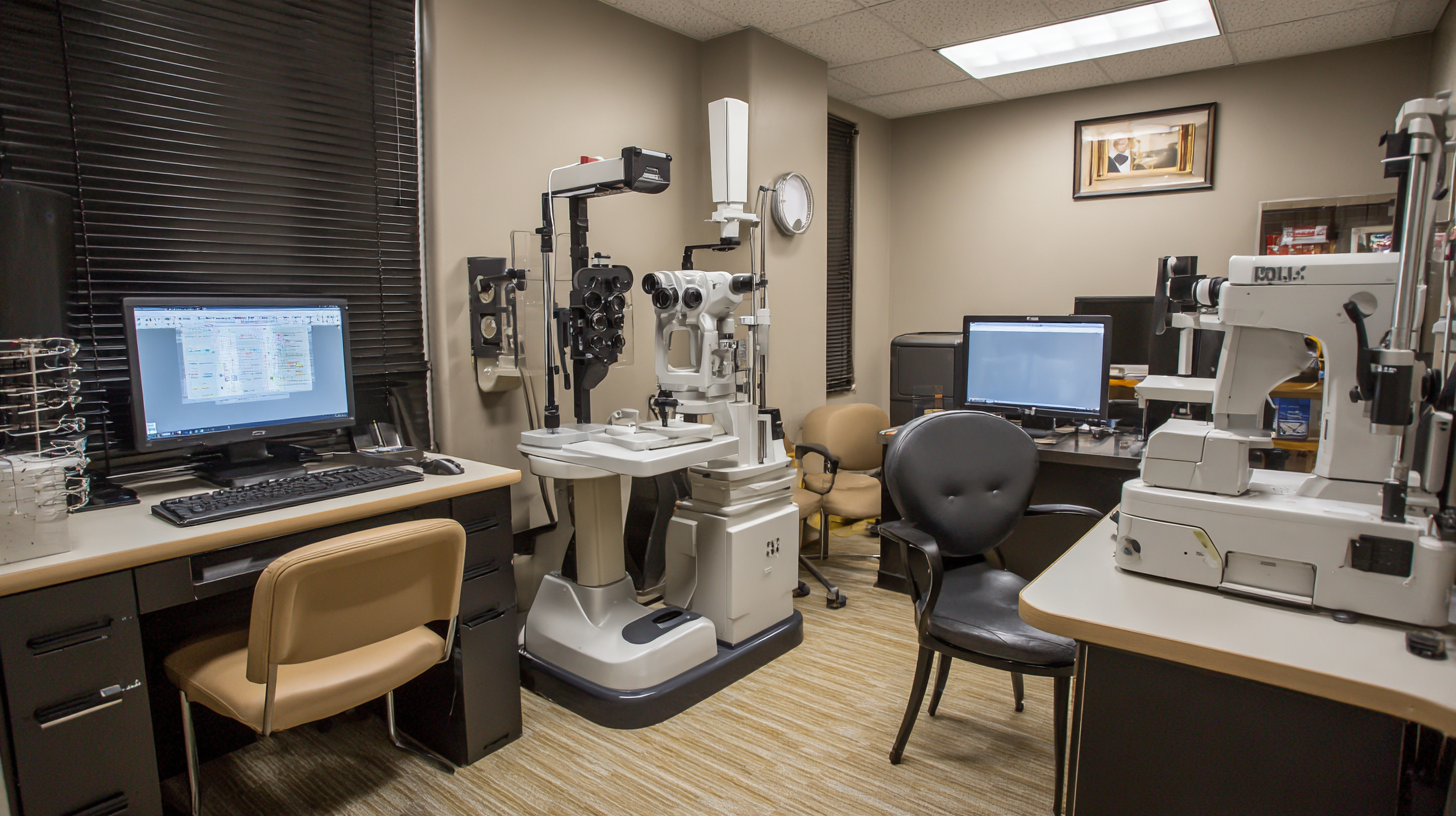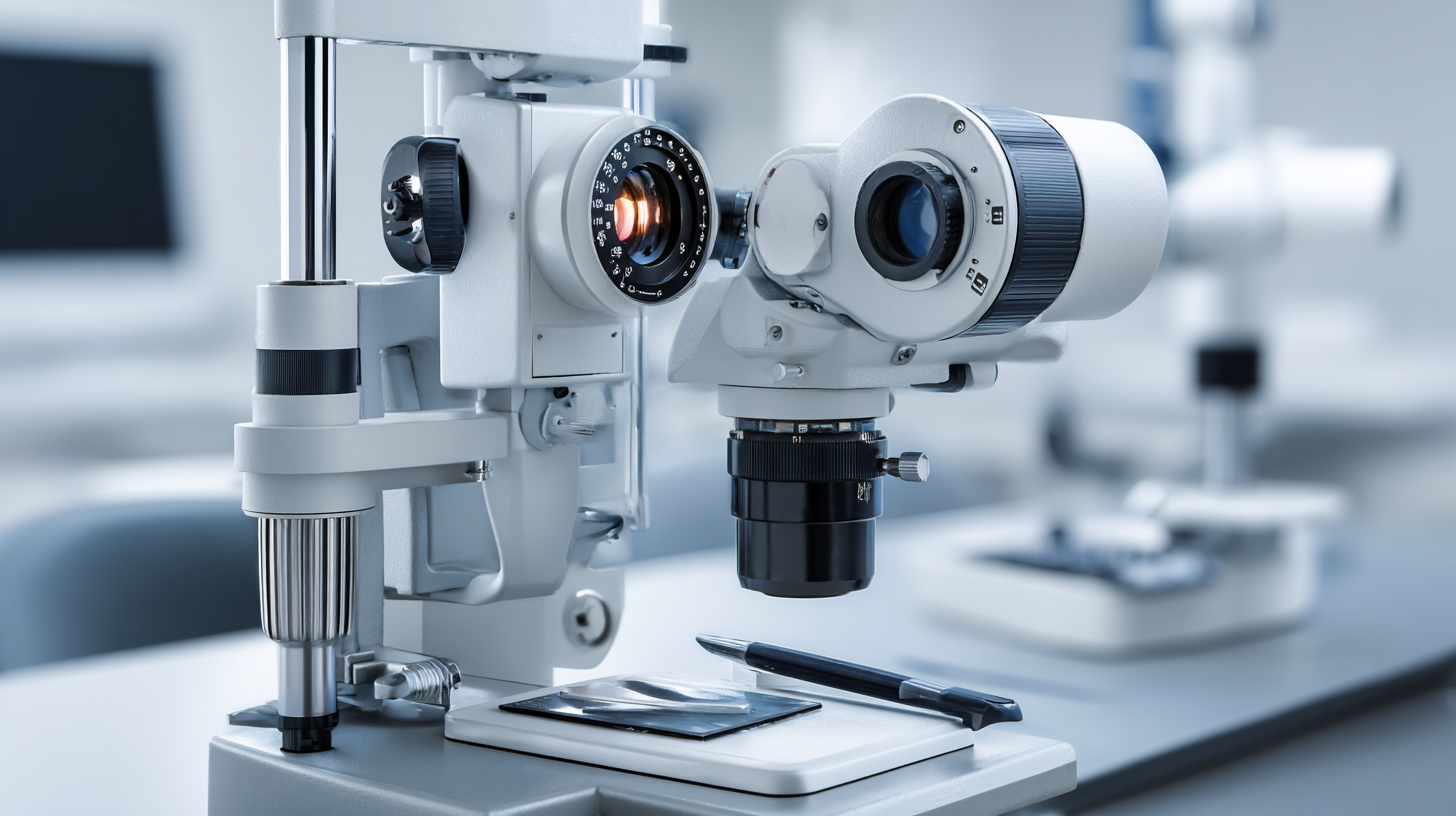8 Powerful Reasons to Choose the Best Optometry Equipment for Your Practice
In the fast-evolving field of optometry, the choice of equipment is pivotal to delivering exceptional patient care and ensuring operational efficiency. The right Optometry Equipment not only enhances diagnostic accuracy but also streamlines workflow, allowing practitioners to focus on what truly matters—their patients. However, with the plethora of options available in the market, ensuring adherence to industry production standards can become challenging. This blog explores eight powerful reasons why selecting the best Optometry Equipment is essential for your practice, highlighting the profound impact it has on patient outcomes, practice reputation, and overall success. By understanding the importance of quality and compliance, optometrists can make informed decisions that align with both their professional goals and the rigorous demands of the industry.

The Impact of High-Quality Optometry Equipment on Patient Satisfaction
When it comes to providing exceptional eye care, the quality of the optometry equipment used in your practice can greatly influence patient satisfaction. High-quality equipment not only ensures accurate diagnoses but also enhances the overall experience for your patients. When patients see that you are using the best tools, their trust in your expertise grows, leading to increased loyalty and referrals.
**Tip:** Invest in technology that allows for quicker and more precise examinations. Equipment like digital refractors can streamline the process, allowing patients to receive their prescriptions faster. This efficiency can significantly enhance their visit, leaving them feeling valued and cared for.
Furthermore, advanced optometry tools often come with features that can make examinations more comfortable for patients. Instruments that reduce glare or eye strain can turn a basic assessment into a pleasant experience. When patients feel physically comfortable during their visit, they are more likely to return and recommend your services to others.
**Tip:** Regularly update your equipment and provide training for your staff. When your team is confident in using the latest technology, it reflects positively on their interaction with patients, creating a welcoming environment that prioritizes their needs.
8 Powerful Reasons to Choose the Best Optometry Equipment for Your Practice - The Impact of High-Quality Optometry Equipment on Patient Satisfaction
| Reason | Impact on Patient Satisfaction | Expected Improvement in Efficiency | Return on Investment (ROI) |
|---|---|---|---|
| Enhanced Diagnosis Accuracy | Increases trust and confidence in care | 30% reduction in time spent per exam | 20% increase in patient retention rate |
| Faster Screening Processes | Shorter wait times improve overall experience | 40% reduction in waiting time | 15% increase in new patient referrals |
| Advanced Technology Features | Higher satisfaction with services offered | Improved accuracy leads to quicker diagnoses | 25% increase in treatment acceptance |
| Better Patient Education Tools | Enhanced understanding leads to proactive care | Increased engagement during visits | 30% boost in patient compliance with treatment plans |
| Improved Comfort and Convenience | Positive feelings associated with their visit | Less patient anxiety during exams | Diminished no-show rates by 20% |
| Streamlined Workflow | More efficient practices mean happier patients | Reduced redundancies in procedures | Increased profitability through faster service |
| Comprehensive Care Options | Patients feel their needs are fully met | Ability to manage complex cases effectively | Diversified revenue streams |
| Increased Patient Loyalty | Repeat visits contribute to stronger relationships | Long-term patient engagement | Higher overall satisfaction ratings |
Cost-Benefit Analysis: Investing in the Latest Optometry Technology
Investing in the latest optometry technology is not just an upgrade; it's a strategic move that can significantly enhance the overall effectiveness of your practice. A detailed cost-benefit analysis reveals that modern equipment often leads to improved patient outcomes. By providing high-quality diagnostics and treatment, you can increase patient satisfaction, fostering loyalty and encouraging referrals. Though the initial investment might seem daunting, the long-term benefits, such as reduced operational costs and higher service efficiency, create a compelling financial rationale.
Furthermore, adopting cutting-edge technology can differentiate your practice in a competitive market. Patients are increasingly seeking providers who leverage the latest advancements for their eye care. The right equipment—like advanced imaging systems and automated refractors—not only streamlines processes but also adds value to your services. Over time, the improved accuracy in diagnoses and treatments often translates to higher revenue, as satisfied patients return for follow-ups and spread the word about their positive experiences. Embracing innovation in your optometry practice is thus not just a possibility, but a necessity for growth and sustainability.

Comparative Review of Essential Instruments for Modern Optometry Practices
In modern optometry practices, selecting the right instruments is crucial for delivering exceptional patient care. A comparative review of essential equipment can guide practitioners in making informed decisions that enhance both accuracy and efficiency. Instruments such as digital phoropters, fundus cameras, and Optical Coherence Tomography (OCT) devices stand at the forefront of technological advancements in the field. Each of these tools offers unique functionalities, enabling optometrists to diagnose and treat a wide range of ocular conditions effectively.
When considering the best optometry equipment, it's important to assess each instrument's compatibility with your practice's needs. Tip: Always prioritize devices with user-friendly interfaces and robust support from manufacturers, as this can significantly improve the workflow and learning curve for staff. Additionally, investing in multi-functional equipment can save space and provide versatility, allowing your practice to adapt as patient demands evolve.
One must also consider the long-term benefits of quality over initial costs. Tip: Don’t hesitate to ask for demonstrations or trials to gauge the equipment's performance in real-world settings. Finding the right balance between cost-effectiveness and high-quality tools will ultimately enhance service delivery and patient satisfaction in your practice.
How Advanced Optometry Tools Enhance Diagnostic Accuracy
In the ever-evolving field of optometry, the precision of diagnostic tools plays a crucial role in patient care. Advanced optometry equipment not only enhances the accuracy of diagnoses but also streamlines the entire examination process. With tools like digital retinal cameras and OCT (Optical Coherence Tomography) machines, practitioners can obtain high-resolution images of the eye, allowing for early detection of conditions such as glaucoma and macular degeneration. These state-of-the-art diagnostic assets provide indispensable insights that traditional methods may overlook, paving the way for timely intervention.
Moreover, utilizing sophisticated tools fosters a more comprehensive patient experience. Patients today are increasingly knowledgeable and expect their optometrists to leverage the latest technology for the best outcomes. By integrating advanced equipment into practice, optometrists demonstrate a commitment to quality care, which can enhance patient trust and satisfaction. As technology continues to progress, investing in the best optometry equipment becomes imperative for practices aiming to remain competitive while improving diagnostic accuracy and treatment efficacy.
Impact of Advanced Optometry Tools on Diagnostic Accuracy
The Role of Innovative Equipment in Streamlining Practice Efficiency
Investing in the best optometry equipment is crucial for enhancing the efficiency of your practice. Innovative tools not only streamline patient examinations but also significantly reduce the workload on staff, allowing them to focus more on patient care. For instance, advanced diagnostic devices can quickly deliver accurate results, eliminating the need for redundant tests and minimizing patient wait times. This efficiency creates a smoother workflow, helping practices run more effectively while simultaneously boosting patient satisfaction.

